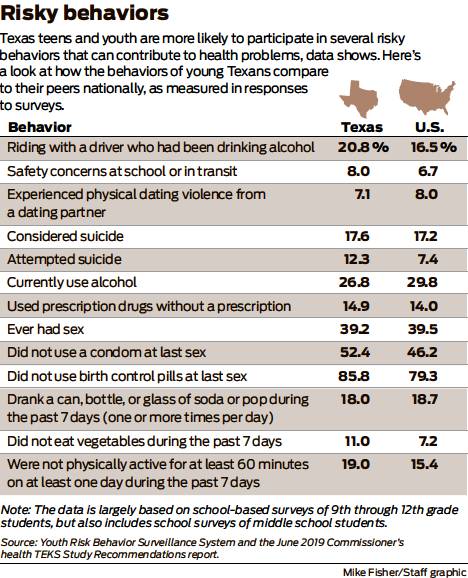Reality could shift state’s sex ed standards
Edits may include lessons on contraception and gender identity — not just abstinence
By Andrea Zelinski AUSTIN BUREAU
AUSTIN — Abstinence has long been the backbone of sex education in Texas, but this summer state officials are suggesting teachers also should be having conversations with children about contraceptives, sexual and gender identity, and how to say no.
Texas has the fourth-highest teen pregnancy rate in the nation, with above-average numbers of students reporting they have sex without condoms and engage in other risky behaviors. In light of those realities, Texas education commissioner Mike Morath is recommending students begin learning about reproductive and sexual health in age-appropriate ways as early as kindergarten and understand “sexual risk avoidance” by the end of middle school.
“How health education is framed is very important,” read the recommendations for updating state’s 22-year-old standards. It adds, “merely teaching health literacy is insufficient to result in behavioral change and positive outcomes.”
A team of educators now will suggest edits to individual state health education standards to the State Board of Education, an elected body known for engaging in culture wars on social issues. In recent years, the board fought about the content of Mexican American heritage textbooks that described Mexicans as lazy. Last summer, the board dwelled on keeping Moses in the social studies curriculum as an influence to the nation’s founding fathers.
The sex education recommendations don’t say the words “contraception” or “gender identity,” but it’s clear that they are calling for teachers to address both of them.
“This is obviously going to be a contentious topic to deal with,” said Ruben Cortez Jr., a Democrat from Brownsville and member of the state board. “I don’t think they’re going to want this being taught. I think they’re going to want it the same as it is today.”
State law requires sex education focus on abstinence. Teachers must devote more attention to abstinence from sexual activity than to any other behavior and present it as the preferred choice for all unmarried students of school age. But local school districts also have the power to shape the sex education curriculum, and can go far beyond that if they choose to do so.
More than eight in 10 Texas school districts teach abstinence only or have no sex education at all, according to a 2017 report from the Texas Freedom Network, a left-leaning group that has long been a watchdog of the State Board of Education. That report found nearly 17 percent of schools teach more than abstinence, including eight of the top 10 largest school districts.
For kindergartners, the proposed changes would include lessons about “understanding a sense of self.”
That suggestion would “obviously include sexual orientation and gender identity,” said Dan Quinn, research director with the Texas Freedom Network. “It’s kind of hard to imagine what else sense of self would mean if it didn’t include that.”
The recommendations say schools should teach students to cultivate skills for healthy relationships, explore personal safety and set limits and boundaries in kindergarten through all grade levels. By the end of middle school, adolescents should “understand sexual risk avoidance” and “learn sexual risk reduction methods that may be needed later in their lives,” which would ostensibly include condoms and birth control.
Young Texans are about as likely to have had sex as their peers in other states, according to surveys of high school students conducted by the Centers for Disease Control and Prevention. However, 52 percent of teens reported they did not use a condom last time they had sex, 6 percentage points higher than teens nationally.
Although teen birth rates have shrunk over the last three decades, Texas ranks fourth-highest in the nation. In 2017, Texas reported 27.6 teen births for every 1,000 girls aged 15 to 19 years old. Nationally, that rate is 18.8 births, according to the U.S. Department of Health and Human Services.
The report recommends a focus on healthy relationships. Education about bullying should begin in third grade and continue through 12th grade. The consequences of sexual harassment and teen dating should be introduced in 7th grade, according to the report.
The recommendations come as Texas students struggle with a variety of health issues.
One in 10 children age 12 to 17 report having experienced a major depressive episode in the past year and 12.3 percent reported attempting committing suicide, leading to recommendations that students begin to recognize in 7th grade when they themselves or others might need support or intervention.
Morath’s report also recommends students learn in primary grades to “show acceptance of others by respecting differing perspectives, while resisting prejudice and stereotypes.”
